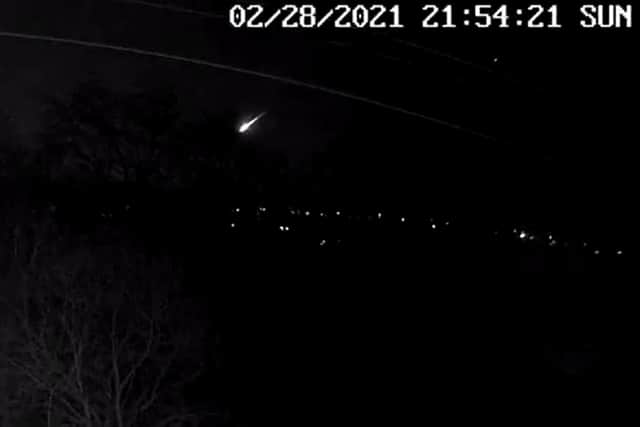Meteor UK: what is a fireball meteor, where did it land in England - and what do you do if you find a meteorite?
Meteorite fragments are likely to have fallen to the ground over England after a fireball pierced Earth’s atmosphere on Sunday (28 February) night.
The yellow-green meteor lit up the sky, wowing observers all over the UK who were lucky enough to experience the phenomenon.
Advertisement
Hide AdAdvertisement
Hide AdScientists believe that some pieces of the meteor will have survived the extreme heat after entering the atmosphere, landing on Earth.


People are hunting for the fragments which could contain important scientific information.
So, what is a fireball meteor, where did fragments of it land in England - and what do you do if you find a meteorite?
Here is everything you need to know.
What is a fireball meteor?
A meteor is space matter that burns up as it enters the Earth’s atmosphere.
Advertisement
Hide AdAdvertisement
Hide AdSo, a fireball meteor is simply a particularly bright meteor.
Whatever is left of a meteor after it hits the surface of our planet is known as a meteorite.
Scientists are interested in studying meteorites as they can provide crucial information about the history of the solar system.
This particular meteor may have originated in the outer asteroid belt between Mars and Jupiter, the trajectory work from camera data has suggested.
Advertisement
Hide AdAdvertisement
Hide AdMany people across Northern Europe spotted the fireball in the sky shortly before 10pm on Sunday evening.
Eyewitness accounts described the bright meteor breaking up into several streaks before it went dark.
The fireball, which produced a sonic boom as it sped across the sky in southern England, was also caught on special cameras.
Where did the fragments land?
The meteorite fragments probably landed just north of Cheltenham in Gloucestershire, according to computer modelling which analysed data from specialised fireball cameras.
Advertisement
Hide AdAdvertisement
Hide AdRichard Kacerek, founder of the UK meteor network, a group of amateur astronomers who use cameras to record sightings across the country, said computer modelling suggested the most likely site of the meteor’s impact was near the town.
Using footage from multiple cameras, the observers concluded that small pieces of meteorite could be found there.
It is likely that the rock fragments would be smaller than a golf ball and dark in colour.
Kacerek said his network had already received a few emails from people in the area saying that they had found “something interesting”.
Advertisement
Hide AdAdvertisement
Hide AdThe meteorite sightings will need to be verified by scientists from the Natural History Museum.
Scientists are keen to examine meteorites due to a theory called panspermia, which argues that the chemistry of life exists in space.
What do you do if you find a meteorite?
Anyone who discovers an object that they think might be a meteorite is asked by scientists to photograph it without touching it.
If possible, they should then note the GPS coordinates of the fragment from a phone.
Advertisement
Hide AdAdvertisement
Hide AdThe meteorite should then be bagged up without direct handling.
Kacerek suggested picking any pieces up using a clean plastic bag.
People are also asked not to put a magnet near a meteorite, as it could destroy important information needed to study it.
Members of the public should remember that lockdown restrictions are still in place, and people should not break the rules to look for meteorites, Kacerek cautioned.
When was the last recovered meteorite fall?
Advertisement
Hide AdAdvertisement
Hide AdAround 50 tonnes of extraterrestrial material enters the Earth’s atmosphere each year.
That is mainly in the form of particles called space dust, which are the size of grains of sand.
In the UK, about 20 meteorites are estimated to land on the ground annually.
The last recovered meteorite fall occurred in 1991, in the village of Glatton near Peterborough.
Arthur Pettifor was tending to onions in his garden when a 10cm rock fell into his hedge.